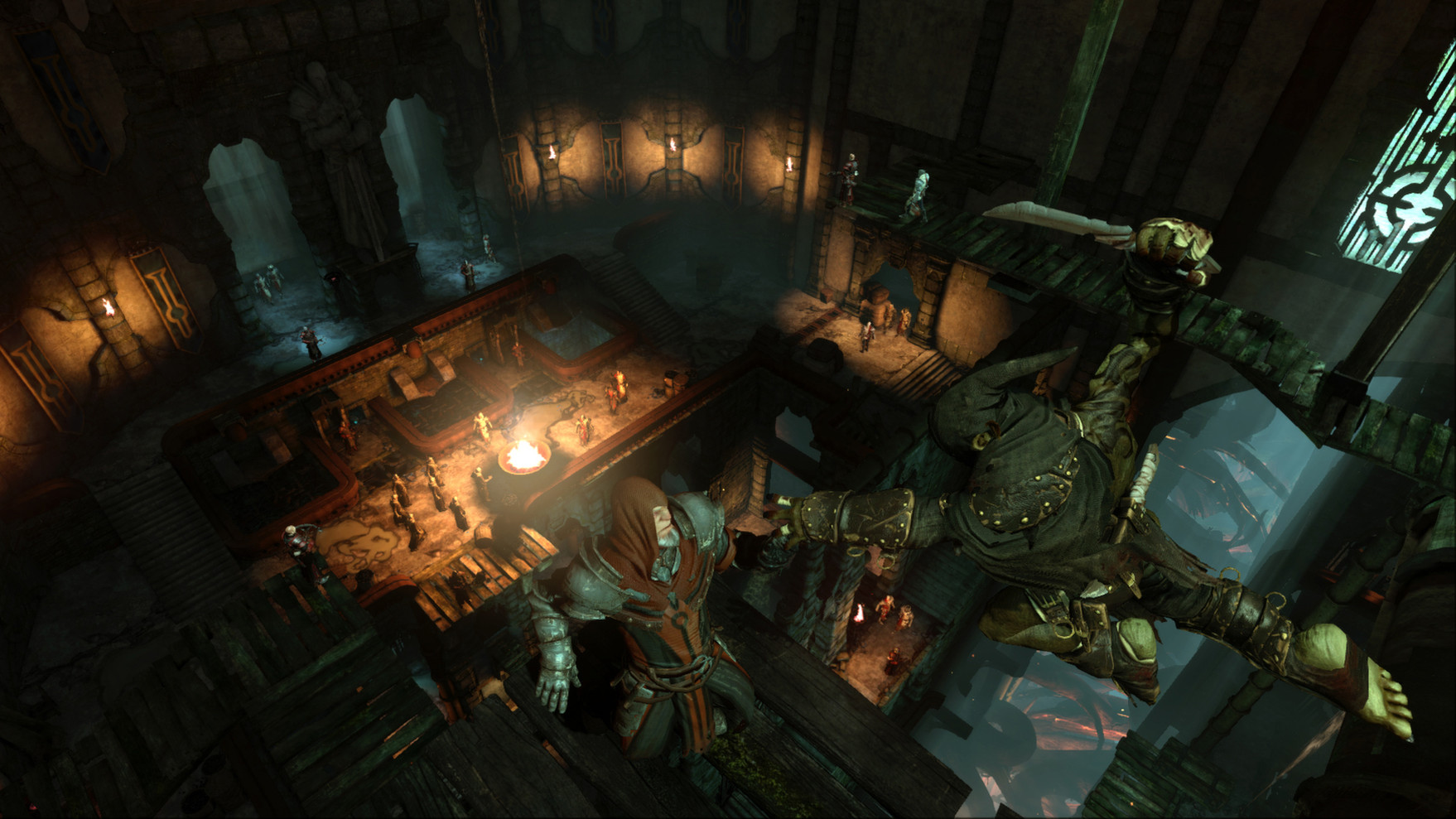
Featured Blog | This community-written post highlights the best of what the game industry has to offer. Read more like it on the Game Developer Blogs or learn how to Submit Your Own Blog Post
The Morality of Anti-Heroes in Video Games: Why it's Fun to be the 'Bad Guy'
Video game heroes are bastions of virtue admired by players far and wide - but what about villains? Why are some of us drawn to nefarious characters, and what does that say about us?

The Morality of Anti-Heroes in Video Games: Why We Don't Always Like Being The 'Good Guy'
You're an honest-to-goodness, law abiding citizen. You don't lie, you don't steal, and you most certainly don't kill. Like most people in society, you behave according to an ethical moral code which forbids any sort of reckless, deviant behavior. But when it comes to video games, that code is temporarily deactivated, and another, largely contradictory set of rules emerges: As Kara, you stole the bus tickets in Detroit: Become Human, and proceeded to lie about having found them. As Spyro the dragon, you routinely set flocks of sheep on fire. And as Garrett the master thief, you picked pockets and swiped valuables without a moment's hesitation. A curious observer might conclude that what's occurring here is a form of cognitive dissonance which has little mental discomfort attached. In fact, a good majority of us enjoy these games tremendously. But why?
Why is it fun to be the 'bad guy'?
1. The thrill of misconduct
"What is locked, can be opened. What is hidden, can be found. What is yours, can be mine."
Morally gray protagonists are fun because of the chaos residing within them. They give us a chance to indulge in our more destructive capacities without the guilt that would ordinarily follow were we subscribing to a more virtuous, socially ordained set of ethics. It's not just liberating, it's exciting.
Through clever use of first-person perspective and meaningful hand animations, Ion Storm's Thief: Deadly Shadows convinces us we are accomplished criminals whenever we pick a lock. We are rewarded for similarly dishonorable acts: stealing loot, resisting arrest, betraying the organization we're supposed to be working with, and neutralizing enemies (or knocking them unconscious) to clear the path ahead for easier, risk-free navigation. Further electrifying gameplay is the realization Garrett's actions aren't for comedic purposes like the wonderful showman Bob Arno—they're for survival. And the ends usually justify the means. That isn't to say games with lighthearted tones can't be equally intriguing; House House's upcoming avian sandbox Untitled Goose Game looks set to hit the mischief-making sweet spot.
2. The paradox of dualism
"People will always believe in monsters. It's easier than accepting their own darkness."
Traditionally speaking, games prefer a clearly defined split between good and evil: benevolent plumbers and their koopa archnemeses, blue hedgehogs and wicked scientists, fair-haired heroes of time and megalomaniac kings. Villains fall, heroes triumph. But Dr. Philip Zimbardo believes reality is far more complex. In his popular 2008 TED Talk, he says that the line between good and evil isn't fixed; it's movable and permeable—even for the average joe.

Image credit: Dontnod Entertainment
One character who exemplifies this shift is military doctor-turned bloodsucker Jonathan E. Reid. In Vampyr, he has to grapple with the desire to murder the very innocents he once swore to protect, and Dontnod is eager to amplify the conflict. As players, we are deliberately encouraged (though not forced) to 'feed' on NPCs as a means of acquiring a huge XP reward. Unsurprisingly, the Life is Strange developers include story-altering consequences for succumbing to temptation, but humor players by leaving enough room for moral justification: vampires kill to survive. It is in their nature, just as it is in the nature of the scorpion to sting. Therefore, what ultimately draws us to Dr. Reid is his paradoxical existence—he is both sinner and saint; one step shy of villain, yet not pure enough to be a champion of good; a depraved beast that clings desperately to the last embers of its humanity. We can show mercy for Dr. Reid's condition while simultaneously renouncing his sinful indulgence. Were he a typical hero—one whose morals never stray from the boulevard of integrity—the personal struggle to resist evil would be comparatively nonexistent, and, arguably, less profound.
3. The appeal of redemption
"I am no longer worthy of being an orc. May my ancestors forgive me."
Arrogant, sarcastic, and selfish: they're probably not the first qualities that spring to mind when envisioning a desirable character. It turns out, however, that we are more likely to pardon the behavior of such characters—a process social psychologists refer to as 'moral disengagement'—if it is underpinned by an altruistic motive. In their 2013 paper published in the journal Mass Communication & Society, Drs. K. Maja Krakowiak and Mina Tsay Vogel show that selfless motivation has even more weight on creating a positive perception of the anti-hero than whether the outcome of their actions is negative.

Image credit: Cyanide Studio
Cyanide's Styx: Master of Shadows is ripe for analysis here: its central character Styx routinely slits throats, snaps necks, poisons guards, and causes catastrophic environmental accidents, but we still love the little bastard. We take solace in the fact his efforts prevent a more evil scheme from achieving fruition, and in a way, this tells players they are still a moral octave above the real villains. But it begs the question: Is there a limit to bad behavior players are willing to accept before it spills into unacceptable territory? Dr. Krakowiak explains researchers haven't really found a definitive threshold:
"Viewers and players are motivated to enjoy the content they consume so they may continue to accept increasingly heinous acts in order to maintain their levels of enjoyment. It is also complicated by the fact that players or viewers can easily justify characters’ behaviors because of the fictional nature of entertainment content. In other words, players may not feel bad about doing bad things in a video game because they know that it is “just a game” and that no one really gets hurt by their actions."
4. The shock of role-reversal
"Be ever diligent, for thine enemies are a multitude, and sin never sleeps."
Another interesting phenomenon which occurs whenever we play as an anti-hero is the unexpected moral 180. And it is precisely because heroic protagonists are the default that this feels so startling. When viewing the world from any given perspective, it is not us who is 'bad', but anybody around us who attempts to derail our objectives. When Garrett is creeping through Saint Edgar's Church, every single Hammerite guard suddenly becomes the villain; he is simply on a mission to 'acquire' a holy relic for the Keepers; he is now 'good'. It is particularly important to mention that the interactive nature of gaming only serves to accentuate immersion, and by extension, the degree with which we identify with Garrett: the tactile 'click' as we snatch items; the hushed footsteps of nearby guards striking fear into our hearts; the gentle depression of WASD keys required to sneak behind an NPC and subsequent adrenaline rush when we successfully empty their pockets (or ghost by) without raising suspicion. All these sensory elements combine, not just to reel us away from reality, but to quietly untie long-held assumptions about whether immoral actions are truly indicative of an evil character—especially when that character is now us.
Visiting the Dark Side
Games which let us play as a character who isn't required to uphold the laws of heroism are relatively scarce. It is far more common to install a hero like Link, who we all know is in opposition to evil, or Lara Croft, arbiter of justice in a world consumed by treacherous organizations and mythological impossibilities. But when anti-heroes enter the fray, they blur the schism between good and bad, leading us to question whether they are just villains or heroes stuck in limbo. They slowly twist our moral compass each time we inhabit them, inviting us to relish in the joys of anarchy, hold our breaths for redemption, and urge us to reexamine a quote as old as time:
We're not so different, you and I.
Read more about:
Featured BlogsAbout the Author(s)
You May Also Like







.jpeg?width=700&auto=webp&quality=80&disable=upscale)








